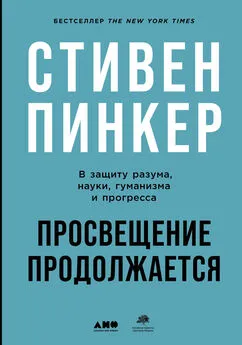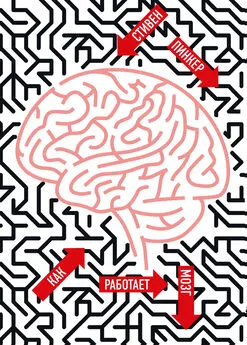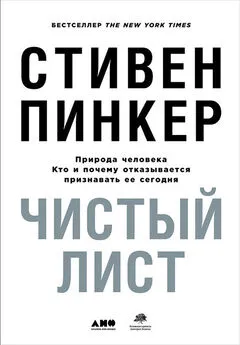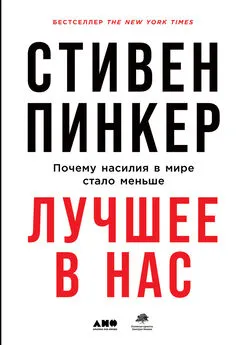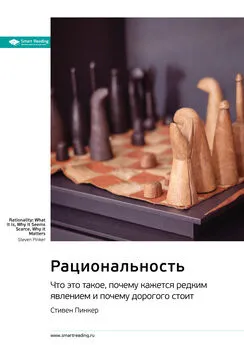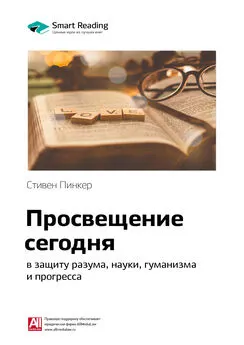Стивен Пинкер - Просвещение продолжается. В защиту разума, науки, гуманизма и прогресса
- Название:Просвещение продолжается. В защиту разума, науки, гуманизма и прогресса
- Автор:
- Жанр:
- Издательство:Альпина нон-фикшн
- Год:2021
- Город:Москва
- ISBN:9785001395362
- Рейтинг:
- Избранное:Добавить в избранное
-
Отзывы:
-
Ваша оценка:
Стивен Пинкер - Просвещение продолжается. В защиту разума, науки, гуманизма и прогресса краткое содержание
Этот прогресс – не случайность и не результат действия внешних сил. Это дар современному миру от деятелей Просвещения, которые первыми додумались, что знания можно использовать во имя процветания всего человечества. Идеи Просвещения – вовсе не наивные мечтания. Наоборот, они сработали – и это неоспоримый факт. Тем не менее именно сейчас эти идеи особенно нуждаются в нашей защите, поскольку противостоят характерным недостаткам человеческой природы – трайбализму, авторитаризму, демонизации чужаков и магическому мышлению, – которые так нравится эксплуатировать современным демагогам. Да, стоящие перед человечеством проблемы огромны, но все они решаемы, если мы, продолжая дело Просвещения, используем для этого разум, доверяем науке и руководствуемся идеалами гуманизма.
Особенности
Более 70 графиков из почти всех областей человеческой жизни.
Для кого
Для поклонников Стивена Пинкера. Для всех, кто интересуется природой человека. Для тех, кто верит в прогресс, и для тех, кто в нем сомневается.
Просвещение продолжается. В защиту разума, науки, гуманизма и прогресса - читать онлайн бесплатно ознакомительный отрывок
Интервал:
Закладка:
Pinker, S. 2008b. The stupidity of dignity. New Republic, May 28.
Pinker, S. 2010. The cognitive niche: Coevolution of intelligence, sociality, and language. Proceedings of the National Academy of Sciences, 107, 8993–99.
Pinker, S. 2011. The better angels of our nature: Why violence has declined . New York: Penguin.
Pinker, S. 2012. The false allure of group selection. Edge . http://edge.org/conversation/steven-pinker-the-false-allure-of-group-selection.
Pinker, S. 2013a. George A. Miller (1920–2012). American Psychologist, 68, 467–68.
Pinker, S. 2013b. Science is not your enemy. New Republic, Aug. 6.
Pinker, S., & Wieseltier, L. 2013. Science vs. the humanities, round III. New Republic, Sept. 26.
Pinker, Susan. 2014. The village effect: How face o ace contact can make us healthier, happier, and smarter . New York: Spiegel & Grau.
Plomin, R., & Deary, I. J. 2015. Genetics and intelligence differences: Five special findings. Molecular Psychiatry, 20, 98–108.
PLOS Medicine Editors. 2013. The paradox of mental health: Over reatment and under ecognition. PLOS Medicine, 10, e1001456.
Plumer, B. 2015. Global warming, explained. Vox . http://www.vox.com/cards/global-warming/what-is-global-warming.
Popper, K. 1945 /2013. The open society and its enemies . Princeton, NJ: Princeton University Press.
Popper, K. 1983. Realism and the aim of science . London: Routledge.
Porter, M. E., Stern, S., & Green, M. 2016. Social Progress Index 2016 . Washington: Social Progress Imperative.
Porter, R. 2000. The creation of the modern world: The untold story of the British Enlightenment . New York: Norton.
Potts, M., & Hayden, T. 2008. Sex and war: How biology explains warfare and terrorism and offers a path to a safer world . Dallas, TX: Benbella Books.
Powell, J. L. 2015. Climate scientists virtually unanimous: Anthropogenic global warming is true. Bulletin of Science, Technology & Society , 35, 121–24.
Prados de la Escosura, L. 2015. World human development, 1870–2007. Review of Income and Wealth, 61, 220–47.
Pratto, F., Sidanius, J., & Levin, S. 2006. Social dominance theory and the dynamics of intergroup relations: Taking stock and looking forward. European Review of Social Psychology, 17, 271–320.
Preble, C. 2004. John F. Kennedy and the missile gap . DeKalb: Northern Illinois University Press.
Price, E. M. 2009. Darwin’s connection to Nazi eugenics exposed. The Primate Diaries . http://scienceblogs.com/primatediaries/2009/07/14/darwins-connection-to-nazi-eug/.
Price, R. G. 2006. The mis-portrayal of Darwin as a racist. RationalRevolution.net. http://www.rationalrevolution.net/articles/darwin_nazism.htm.
Proctor, B. D., Semega, J. L., & Kollar, M. A. 2016. Income and poverty in the United States: 2015 . Washington: United States Census Bureau. http://www.census.gov/content/dam/Census/library/publications/2016/demo/p60-256.pdf.
Proctor, R. N. 1988. Racial hygiene: Medicine under the Nazis. Cambridge, MA: Harvard University Press.
Pronin, E., Lin, D. Y., & Ross, L. 2002. The bias blind spot: Perceptions of bias in self versus others. Personality and Social Psychology Bulletin, 28, 369–81.
Pryor, F. L. 2007. Are Muslim countries less democratic? Middle East Quarterly, 14, 53–58.
Publius Decius Mus (Michael Anton). 2016. The flight 93 election. Claremont Review of Books Digital . http://www.claremont.org/crb/basicpage/the-flight-93-election/.
Putnam, R. D., & Campbell, D. E. 2010. American grace: How religion divides and unites us . New York: Simon & Schuster.
Quarantelli, E. L. 2008. Conventional beliefs and counterintuitive realities. Social Research, 75, 873–904.
Rachels, J., & Rachels, S. 2010. The elements of moral philosophy . Columbus, OH: McGraw-Hill.
Radelet, S. 2015. The great surge: The ascent of the developing world . New York: Simon & Schuster.
Railton, P. 1986. Moral realism. Philosophical Review, 95, 163–207.
Randle, M., & Eckersley, R. 2015. Public perceptions of future threats to humanity and different societal responses: A cross-national study. Futures, 72, 4–16.
Rawcliffe, C. 1998. Medicine and society in later medieval England. Stroud, UK: Sutton.
Rawls, J. 1976. A theory of justice . Cambridge, MA: Harvard University Press.
Ray, J. L. 1989. The abolition of slavery and the end of international war. International Organization, 43, 405–39.
Redlawsk, D. P., Civettini, A. J. W., & Emmerson, K. M. 2010. The affective tipping point: Do motivated reasoners ever “get it”? Political Psychology, 31, 563–93.
Reese, B. 2013. Infinite progress: How the internet and technology will end ignorance, disease, poverty, hunger, and war . Austin, TX: Greenleaf Book Group Press.
Reverby, S. M., ed. 2000. Tuskegee’s truths: Rethinking the Tuskegee syphilis study . Chapel Hill: University of North Carolina Press.
Rhodes, R. 2010. Twilight of the bombs . New York: Knopf.
Rice, J. W., Olson, J. K., & Colbert, J. T. 2011. University evolution education: The effect of evolution instruction on biology majors’ content knowledge, attitude toward evolution, and theistic position. Evolution: Education and Outreach, 4, 137–44.
Richards, R. J. 2013. Was Hitler a Darwinian? Disputed questions in the history of evolutionary theory . Chicago: University of Chicago Press.
Rid, T. 2012. Cyber war will not take place. Journal of Strategic Studies, 35, 5–32.
Ridley, M. 2000. Genome: The autobiography of a species in 23 chapters . New York: HarperCollins.
Ridley, M. 2010. The rational optimist: How prosperity evolves . New York: HarperCollins.
Ridout n, A. M. 2008. News media use and Americans’ perceptions of al threat. British Journal of Political Science, 38, 575–93.
Rijpma, A. 2014. A composite view of well eing since 1820. In J. van Zanden, J. Baten, M. M. d’Ercole, A. Rijpma, C. Smith, & M. Timmer, eds., How was life? Global well eing since 1820 . Paris: OECD Publishing.
Riley, J. C. 2005. Estimates of regional and global life expectancy, 1800–2001. Population and Development Review, 31, 537–43.
Rindermann, H. 2008. Relevance of education and intelligence for the political development of nations: Democracy, rule of law and political liberty. Intelligence, 36, 306–22.
Rindermann, H. 2012. Intellectual classes, technological progress and economic development: The rise of cognitive capitalism. Personality and Individual Differences, 53, 108–13.
Risso, M. I. 2014. Intentional homicides in São Paulo city: A new perspective. Stability: International Journal of Security & Development, 3, art. 19.
Ritchie, H., & Roser, M. 2017. CO2 and other greenhouse gas emissions. Our World in Data . https://ourworldindata.org/co2-and-other-greenhouse-gas-emissions/.
Ritchie, S. 2015. Intelligence: All that matters . London: Hodder & Stoughton.
Ritchie, S., Bates, T. C., & Deary, I. J. 2015. Is education associated with improvements in general cognitive ability, or in specific skills? Developmental Psychology, 51, 573–82.
Rizvi, A. A. 2017. The atheist Muslim: A journey from religion to reason . New York: St. Martin’s Press.
Robinson, F. R. 2009. The case for rational optimism . New Brunswick, NJ: Transaction.
Robinson, J. 2013. Americans less rushed but no happier: 1965–2010 trends in subjective time and happiness. Social Indicators Research, 113, 1091–1104.
Robock, A., & Toon, O. B. 2012. Self ssured destruction: The climate impacts of nuclear war. Bulletin of the Atomic Scientists, 68, 66–74.
Romer, P. 2016. Conditional optimism about progress and climate. Paul Romer.net. https://paulromer.net/conditional-optimism-about-progress-and-climate/.
Romer, P., & Nelson, R. R. 1996. Science, economic growth, and public policy. In B. L. R. Smith & C. E. Barfield, eds., Technology, R&D, and the economy . Washington: Brookings Institution.
Roos, J. M. 2012. Measuring science or religion? A measurement analysis of the National Science Foundation sponsored Science Literacy Scale, 2006–2010. Public Understanding of Science, 23, 797–813.
Ropeik, D., & Gray, G. 2002. Risk: A practical guide for deciding what’s really safe and what’s really dangerous in the world around you . Boston: Houghton Mifflin.
Rose, S. J. 2016. The growing size and incomes of the upper middle class . Washington: Urban Institute.
Rosen, J. 2016. Here’s how the world could end – and what we can do about it. Science . http://www.sciencemag.org/news/2016/07/here-s-how-world-could-end-and-what-we-can-do-about-it.
Rosenberg, N., & Birdzell, L. E., Jr. 1986. How the West grew rich: The economic transformation of the industrial world . New York: Basic Books.
Rosenthal, B. G. 2002. New myth, new world: From Nietzsche to Stalinism . College Station: Penn State University Press.
Roser, M. 2016a. Child mortality. Our World in Data . https://ourworldindata.org/child-mortality/.
Roser, M. 2016b. Democracy. Our World in Data . https://ourworldindata.org/democracy/.
Roser, M. 2016c. Economic growth. Our World in Data . https://ourworldindata.org/economic-growth/.
Roser, M. 2016d. Food per person. Our World in Data . https://ourworldindata.org/food-per-person/.
Roser, M. 2016e. Food prices. Our World in Data . https://ourworldindata.org/food-prices/.
Roser, M. 2016f. Forest cover. Our World in Data . https://ourworldindata.org/forest-cover/.
Roser, M. 2016g. Global economic inequality. Our World In Data . https://ourworldindata.org/global-economic-inequality/.
Roser, M. 2016h. Human Development Index (HDI). Our World in Data . https://ourworldindata.org/human-development-index/.
Roser, M. 2016i. Human rights. Our World in Data . https://ourworldindata.org/human-rights/.
Roser, M. 2016j. Hunger and undernourishment. Our World in Data . https://ourworldindata.org/hunger-and-undernourishment/.
Roser, M. 2016k. Income inequality. Our World in Data . https://ourworldindata.org/income-inequality/.
Roser, M. 2016l. Indoor air pollution. Our World in Data . https://ourworldindata.org/indoor-air-pollution/.
Roser, M. 2016m. Land use in agriculture. Our World in Data . https://ourworldindata.org/land-use-in-agriculture/.
Roser, M. 2016n. Life expectancy. Our World in Data . https://ourworldindata.org/life-expectancy/.
Roser, M. 2016o. Light. Our World in Data . https://ourworldindata.org/light/.
Roser, M. 2016p. Maternal mortality. Our World in Data . https://ourworldindata.org/maternal-mortality/.
Roser, M. 2016q. Natural catastrophes. Our World in Data . https://ourworldindata.org/natural-catastrophes/.
Roser, M. 2016r. Oil spills. Our World in Data . https://ourworldindata.org/oil-spills/.
Roser, M. 2016s. Treatment of minorities. Our World in Data . https://ourworldindata.org/treatment-of-minorities/.
Roser, M. 2016t. Working hours. Our World in Data . https://ourworldindata.org/working-hours/.
Читать дальшеИнтервал:
Закладка:
